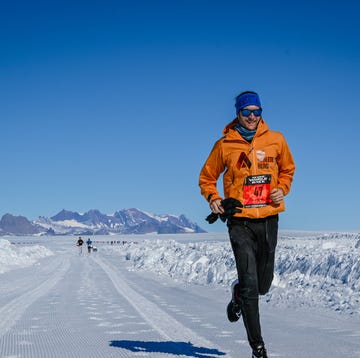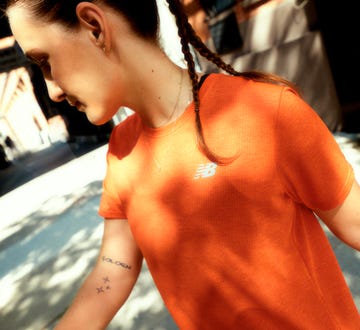I used to be afraid to call myself a feminist. It sounded like the kind of woman a man wouldn’t like.
I used to look at runway photos in fashion magazines as a pre-pubescent teenager and pray that puberty would be good to me, giving me height with the right kind of curves.
I used to look at photos of some of the fastest pro women runners in the world and think “she looks like a man,” wondering how years of training would change my body and if I’d give up performance at some point to maintain more “femininity.”
Feminist. Fashion. Feminity. Those three areas of my identity have swirled around me in separate storms all my life, until the past two years in which their winds have aligned into one tornado. A tornado that touched down on the fashion runway, wearing a crop top racing singlet and leggings.
Cue the lights.
Cue the music.
The distinct voice of Nigerian Feminist Chimamanda Ngozi Adichie, sampled over a techno beat, reverberates through the audience. Nobody walks out. As the first model in Oiselle’s lineup, I am focused, awaiting my cue at the threshold of the runway. I am not to emerge from behind the wall until her final word is spoken and the slow, powerful beat takes over.
“Do I Look Like a Man”
We teach girls to shrink themselves
To make themselves smaller.
We say to girls,
“You can have ambition
coauthor of Believe Training Journal.
Influencer Apologizes for E-Bikes on NYC Course
But not too successful,
Otherwise you will threaten the man.”
Because I am female
I am expected to aspire to marriage.
A Part of Hearst Digital Media
Always keeping in mind that
Marriage is the most important.
Now marriage can be a source of
Joy and love and mutual support
But why do we teach to aspire to marriage
And we don’t teach boys the same?
I am expected to aspire to marriage
Health - Injuries
Which I think can be a good thing
But for the attention of men.
We may earn commission from links on this page, but we only recommend products we back
In the way that boys are.
Feminist: the person who believes in the social
Political, and economic equality of the sexes.
Goosebumps fan across my quads, and rise up the back of my neck until every follicle of my carefully styled coif stands at attention. The beat drops. Sally Bergesen, Oiselle’s CEO and lead designer, moves out of my way and nods, and I step with callused bare feet into the floodlights. Unlike last year I don’t feel like an imposter. I feel confident and proud, with nine more athletes behind me ready to take their turn.
Forty-two years ago, Title IX legally ensured women the right to equal play. More women than men run now. Yet, 42 years later, a sports brand putting muscled runners and a hammer thrower on the runway at NY Fashion Week is newsworthy in the To make themselves smaller. Why are these two worlds still separate? And how is it stunting our definition of femininity?
Late at night, after the fashion show excitement and post-party was over, I lay in bed scrolling through media articles about our show, and something stopped me cold. Runner’s World posted our runway photos on Facebook and among ALL the positive comments was one man commenting directly on me. He said, “She looks like a man.”
I clicked on the comment box at the bottom and watched the cursor blink. There was so much I wanted to say. But first, did I look like a man? When did that happen? I looked at my picture through his eyes. Kara Goucher destroyed me on a 10 miler a few hours before the show, so I was a bit dehydrated. Somewhat androgynous maybe with a lean frame, muscle definition, and a sharpish jaw. But the fact is, I am a woman, and a super competitive professional athlete of 12 years, and this is what I look like. Five minutes ago I felt beautiful. I typed and erased several times before deciding to turn off my phone.
His remark stuck with me for several days, like a bruise, and eventually I realized it wasn’t about me. I began to think bigger, and think about change. At what point does physical strength become a trait reserved for men? When exactly do you cross the line? Is it the same point where courage becomes having balls? The same point where getting it done becomes manning up? Why is there no female corollary for these terms? And why do I, as a feminist, continue to use the dude ones?
Our definition of femininity still has some expanding to do to catch up with the fact that women are athletes now, in lots of shapes and sizes. Women do sports. In droves. Fashion plays a huge role in defining femininity, so to the runway we must go.
It’s time to Woman Up.
We teach girls that they cannot be sexual beings.
***
Lauren Fleshman, is a pro runner for Oiselle, mom of a toddler, founder of Picky Bars, (co)author of Believe Training Journal.














